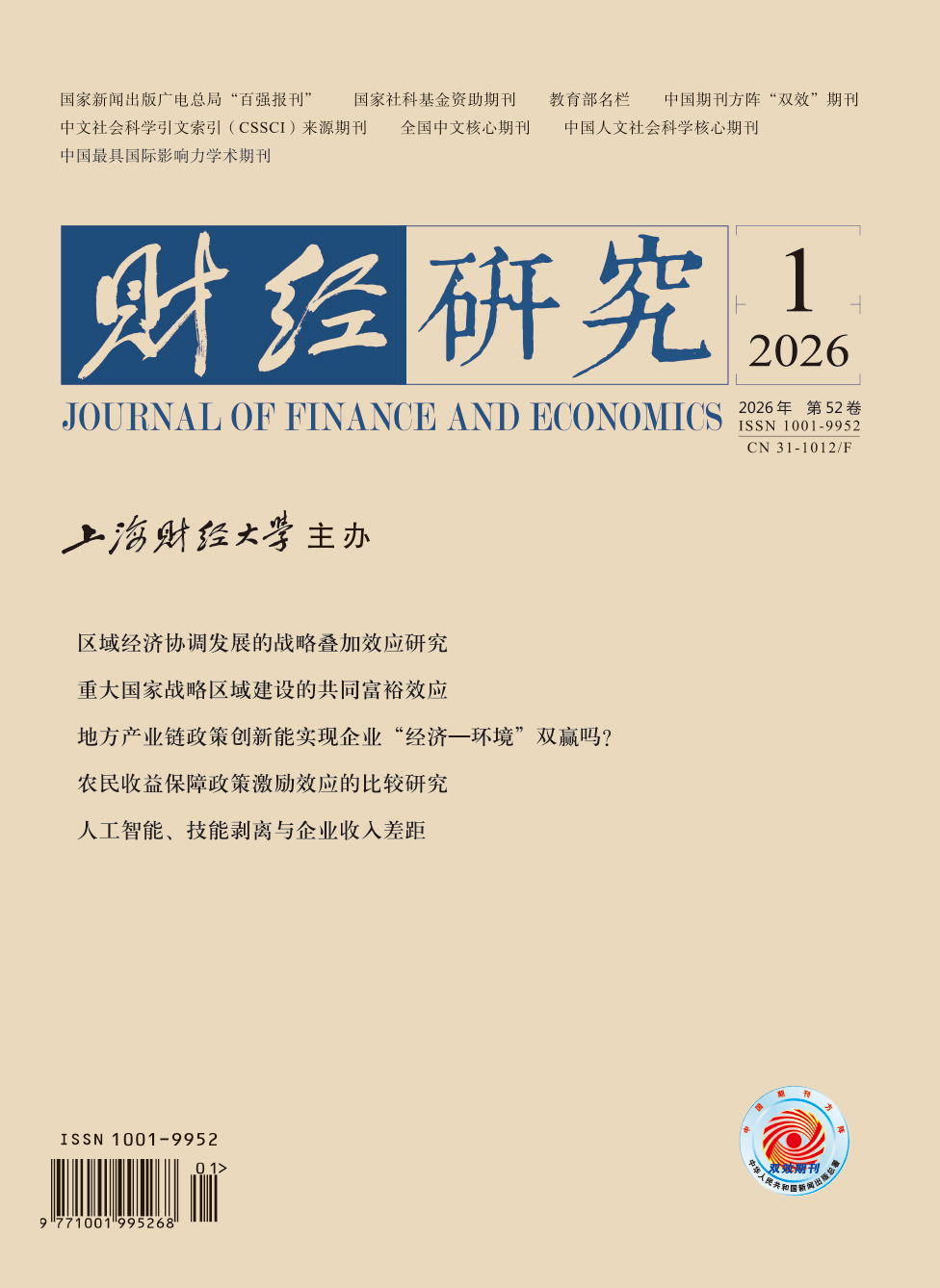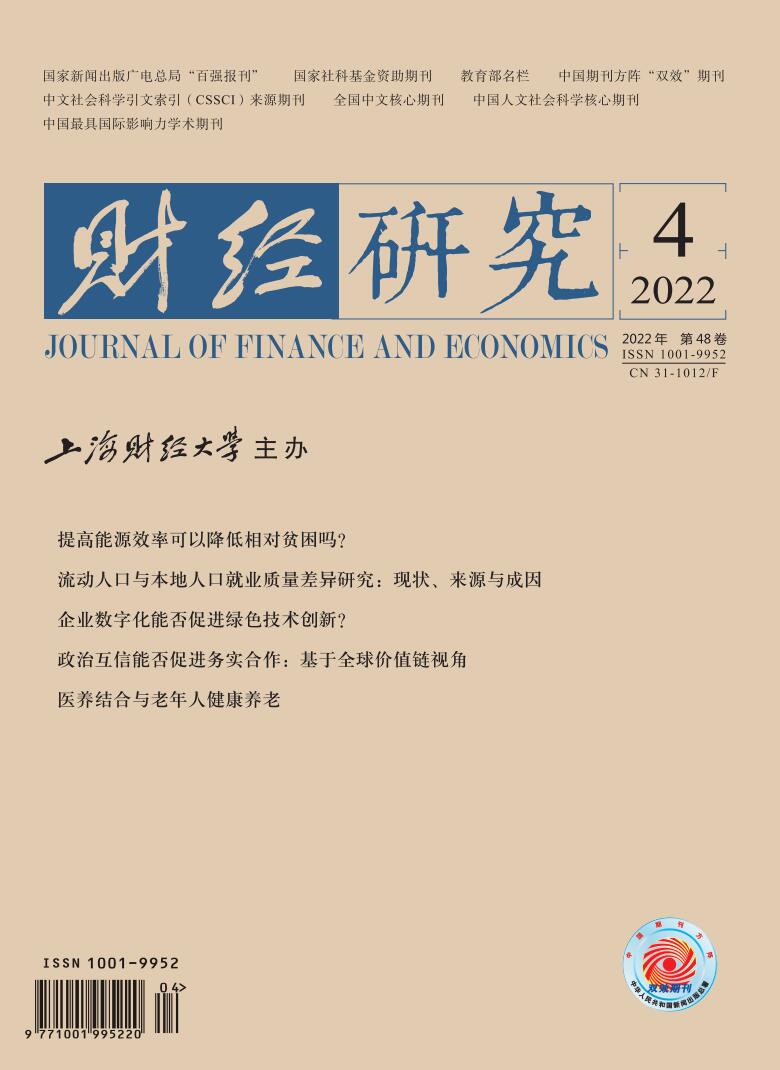在全面脱贫背景与共同富裕目标下,构建缓解相对贫困的长效机制具有重要的理论和现实意义。文章以能源贫困为例,基于组群分析方法,利用两轮中国居民能源消费调查(
提高能源效率可以降低相对贫困吗?——以能源贫困为例
摘要
参考文献
摘要
4 李慷. 能源贫困综合评估方法及其应用研究[D]. 北京: 北京理工大学, 2014.
5 刘自敏,邓明艳,崔志伟,等. 能源贫困对居民福利的影响及其机制:基于CGSS数据的分析[J]. 中国软科学,2020,(8):143−163. DOI:10.3969/j.issn.1002-9753.2020.08.014
7 史丹. 中国能源利用效率问题研究[M]. 北京: 经济管理出版社, 2011.
8 魏一鸣, 廖华, 王科, 等. 中国能源报告(2014): 能源贫困研究[M]. 北京: 科学出版社, 2014.
10 徐盈之,魏瑞. 双重环境规制、能源贫困与包容性绿色发展[J]. 中南大学学报(社会科学版),2021,(2):109−125. DOI:10.11817/j.issn.1672-3104.2021.02.011
12 郑新业, 魏楚, 宋枫, 等. 中国家庭能源消费研究报告(2015)[M]. 北京: 科学出版社, 2016.
13 Abeberese A B. Electricity cost and firm performance: Evidence from India[J]. The Review of Economics and Statis- tics,2017,99(5): 839−852. DOI:10.1162/REST_a_00641
14 Aigner D, Lovell C, Schmidt P. Formulation and estimation of stochastic frontier production function models[J]. Journal of Econometrics,1977,6(1): 21−37. DOI:10.1016/0304-4076(77)90052-5
15 Alberini A, Filippini M. Transient and persistent energy efficiency in the US residential sector: Evidence from household-level data[J]. Energy Efficiency,2018,11(3): 589−601. DOI:10.1007/s12053-017-9599-z
16 Barnes D F, Khandker S R, Samad H A. Energy access, efficiency, and poverty: How many households are energy poor in Bangladesh?[R]. Working Paper, 2016.
17 Barnes D F, Khandker S R, Samad H A. Energy poverty in rural Bangladesh[J]. Energy Policy,2011,39(2): 894−904. DOI:10.1016/j.enpol.2010.11.014
18 Boardman B. Fuel poverty: From cold homes to affordable warmth[M]. London: Belhaven Press, 1991.
19 Filippini M, Geissmann T, Greene W H. Persistent and transient cost efficiency: An application to the Swiss hydropower sector[J]. Journal of Productivity Analysis,2018,49(1): 65−77. DOI:10.1007/s11123-017-0522-6
20 Filippini M, Hunt L C. Energy demand and energy efficiency in the OECD countries: A stochastic demand frontier approach[J]. Energy Journal,2011,32(2): 59−80.
21 Filippini M, Hunt L C. Measurement of energy efficiency based on economic foundations[J]. Energy Economics,2015,52(S1): 5−16.
22 Fylan F, Glew D, Smith M, et al. Reflections on retrofits: Overcoming barriers to energy efficiency among the fuel poor in the United Kingdom[J]. Energy Research & Social Science,2016,21: 190−198.
23 Ganapati S, Shapiro J S, Walker R. Energy cost pass-through in US manufacturing: Estimates and implications for carbon taxes[J]. American Economic Journal: Applied Economics,2020,12(2): 303−42. DOI:10.1257/app.20180474
24 Grey C N B, Schmieder-Gaite T, Jiang S, et al. Cold homes, fuel poverty and energy efficiency improvements: A longitudinal focus group approach[J]. Indoor and Built Environment,2017,26(7): 902−913. DOI:10.1177/1420326X17703450
25 He X P, Reiner D. Electricity demand and basic needs: Empirical evidence from China’s households[J]. Energy Policy,2016,90: 212−221. DOI:10.1016/j.enpol.2015.12.033
26 Hills J. Fule poverty: The problem and its measurement[R]. Interim Report of the Fuel Poverty Review. London: CASE, LSE, 2011.
27 Khandker S R, Barnes D F, Samad H A. Are the energy poor also income poor? Evidence from India[J]. Energy Policy,2012,47(4): 1−12.
28 Khandker S R, Barnes D F, Samad H A. Are the energy poor also income poor? Evidence from India[J]. Energy Policy,2012,47: 1−12.
29 Koomson I, Danquah M. Financial inclusion and energy poverty: Empirical evidence from Ghana[J]. Energy Economics,2021,94: 105085. DOI:10.1016/j.eneco.2020.105085
30 Li W, Chien F, Hsu C C, et al. Nexus between energy poverty and energy efficiency: Estimating the long-run dyna- mics[J]. Resources Policy,2021,72(3): 102063.
31 Nsangou J C, Kenfack J, Nzotcha U, et al. Assessment of the potential for electricity savings in households in Cameroon: A stochastic frontier approach[J]. Energy,2020,211(11): 118576.
32 Nussbaumer P, Bazilian M, Modi V. Measuring energy poverty: Focusing on what matters[J]. Renewable and Sustainable Energy Reviews,2012,16(1): 231−243. DOI:10.1016/j.rser.2011.07.150
33 O’Sullivan K C, Howden-Chapman P L, Fougere G. Making the connection: the relationship between fuel poverty, electricity disconnection, and prepayment metering[J]. Energy Policy,2011,39(2): 733−741. DOI:10.1016/j.enpol.2010.10.046
34 Rosenow J, Platt R, Flanagan B. Fuel poverty and energy efficiency obligations-a critical assessment of the supplier obligation in the UK[J]. Energy Policy,2013,62: 1194−1203. DOI:10.1016/j.enpol.2013.07.103
35 Sadath A C, Acharya R H. Assessing the extent and intensity of energy poverty using Multidimensional Energy Poverty Index: Empirical evidence from households in India[J]. Energy Policy,2017,102(1): 540−550.
36 Sesan T. Navigating the limitations of energy poverty: Lessons from the promotion of improved cooking technologies in Kenya[J]. Energy Policy,2012,47(9): 202−210.
37 Villalobos C, Chávez C, Uribe A. Energy poverty measures and the identification of the energy poor: A comparison between the utilitarian and capability-based approaches in Chile[J]. Energy Policy,2021,152(5): 112146.
38 Walker G. Decentralised systems and fuel poverty: Are there any links or risks?[J]. Energy Policy,2008,36(12): 4514−4517. DOI:10.1016/j.enpol.2008.09.020
引用本文
杨丹, 邓明艳, 刘自敏. 提高能源效率可以降低相对贫困吗?——以能源贫困为例[J]. 财经研究, 2022, 48(4): 4-18.
导出参考文献,格式为:
上一篇:家庭负债对居民健康的影响研究





 8067
8067  8288
8288

